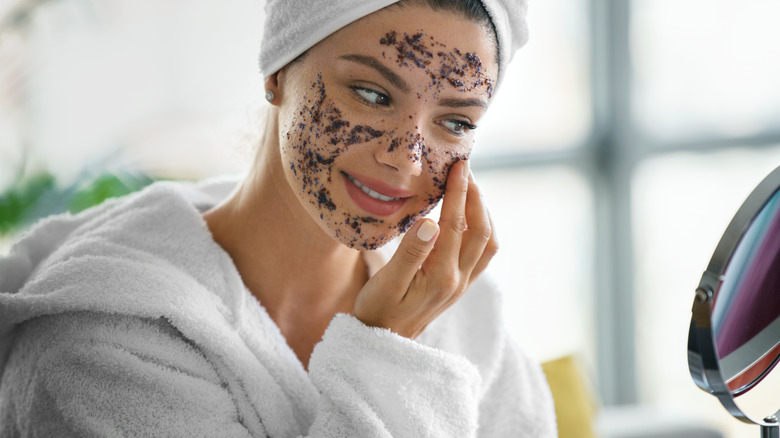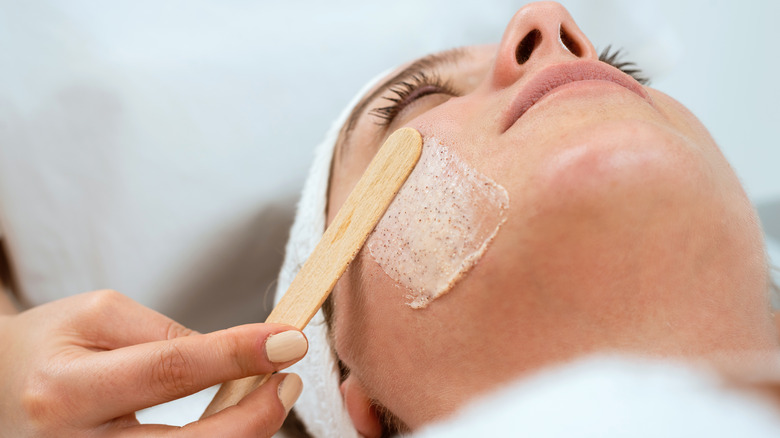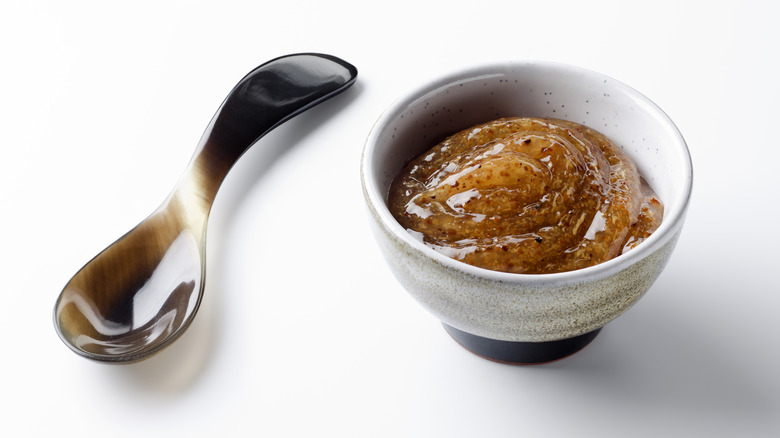Do Physical Exfoliants Really Deserve The Bad Rep? Our Derm Weighs In - Exclusive
In 2016, a class action lawsuit was brought against St. Ives insisting that its popular apricot facial scrub caused "micro-tears" in the skin due to the jagged edges of its primary exfoliating ingredient, crushed walnut shells (via Consumerist). Although the suit was settled two years later, whether physical exfoliants are genuinely harmful to your skin has remained a hotly debated topic among dermatologists, beauty experts, and consumers. Some people are adamant in their anti-physical exfoliant stance, stating that chemical exfoliants are better and more effective; while others have found that when used sparingly and properly, physical exfoliants have their benefits.
Of course, when physical exfoliants are used every day and scrubbed vigorously into the skin like sandpaper on wood, you could easily damage your skin, resulting in increased sensitivity or infection. However, when used correctly, physical exfoliants have benefits for some skin types. To get more clarity on the subject Women.com spoke exclusively with dermatologist Dr. Marisa Garshick, MD, FAAD, for a full-rundown on whether we need to give up the scrubs.
Physical exfoliants don't need to be written off, but they can be harmful if overused
"Physical exfoliants work by mechanically removing dead skin cells, while chemical exfoliants disrupt the bonds between dead skin cells to weaken them so they fall off," Dr. Garshick exclusively explains to Women.com. As for the efficacy, they point out both physical and chemical exfoliants remove dead skin cells and debris that can clog pores and cause acne and rough patches, leaving your face brighter and smoother. The main difference is that physical exfoliants use small texturized particles like salt, sugar, nutshells, or beads, while chemical exfoliants use acids and enzymes to slough away those dead skin cells. Physical exfoliants also include tools such as cleansing brushes that manually exfoliate the skin with their bristles. Many people may prefer them for how they allow a person to feel clean. Dermaplaning is another type of physical exfoliation that removes hair and dead skin cells with a straight razor or blade.
But if you're still concerned about risks, physical exfoliants don't need to be completely written off for good. One early study that looked at the effects of microdermabrasion, a physical exfoliant, vs glycolic peels, a chemical exfoliant, found both processes significantly disrupted the skin barrier. However, the findings noted that the degree of skin changes was actually greater with the chemical peel. In other words, there's nothing to necessarily suggest that chemical peels are automatically safer or better. However, Dr. Garshick tells us that some physical exfoliants are safer for your skin than others.They warn that abrasive scrubs "can cause micro-tears in the skin and disrupt the skin barrier, leading to skin sensitivity, irritation, and redness." They recommend avoiding "harsh or abrasive scrubs or those containing large particles with an irregular shape or jagged edges."
How can you use physical exfoliants effectively?
The bottom line is physical exfoliants maybe aren't as horrible as people make them out to be. But ultimately what will work for you ultimately comes down to your skin type. Dr. Garshick exclusively tells Women.com that if you have sensitive skin, for instance, you may want to steer clear of physical exfoliants and opt for chemical exfoliants instead because they involve less external touching of the skin.That being said, there are still some physical exfoliant options that can work. For instance, polishing powders, which contain physical exfoliants like rice grains, oat, or turmeric, along with antioxidants such as vitamin E or green tea may be gentler way to brighten your complexion. Polishing powders also offer a way to customize your exfoliant – you can add more water to the powder to create a thinner paste that is gentler on the face, or less water for a more texturized exfoliant.
In addition to finding the right product, it is important not to overuse your physical exfoliants as doing so could irritate your skin. Exfoliating once or twice per week should be sufficient. You can even work both chemical and physical exfoliants into your skincare routine, Dr. Garshick advises. She tells us while some people may choose to use products that contain both physical and chemical exfoliants, others "may opt to rotate how they exfoliate using a physical exfoliant one night per week and a chemical exfoliant on another." Rotating your exfoliants, using them sparingly, and trying different types will also allow you to see what works best for your skin type without irritating your skin.


